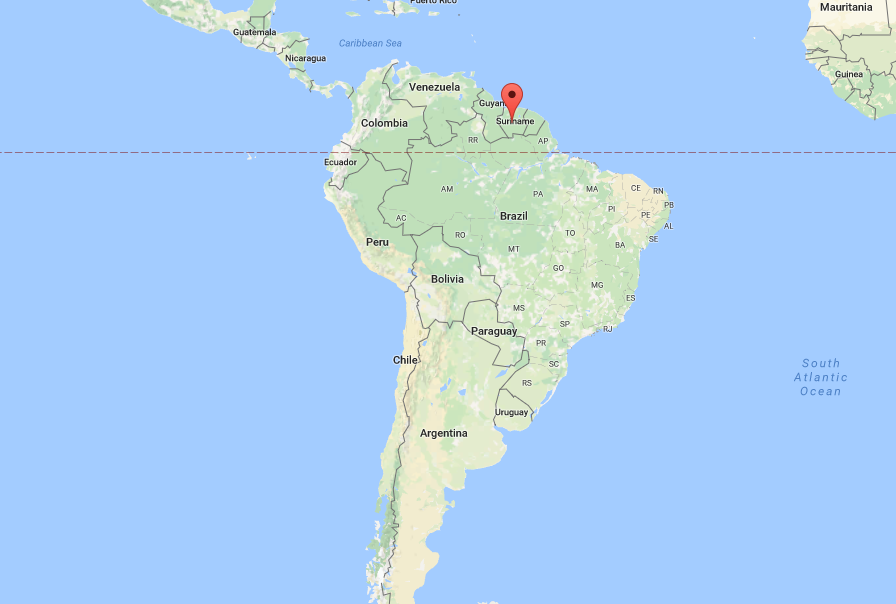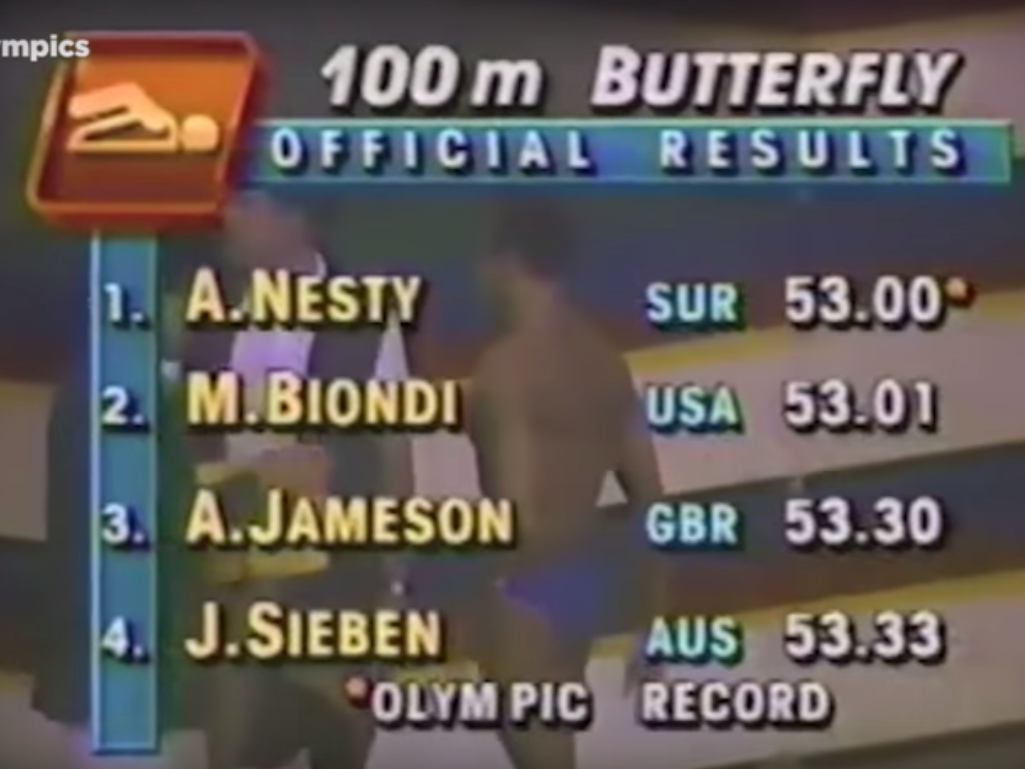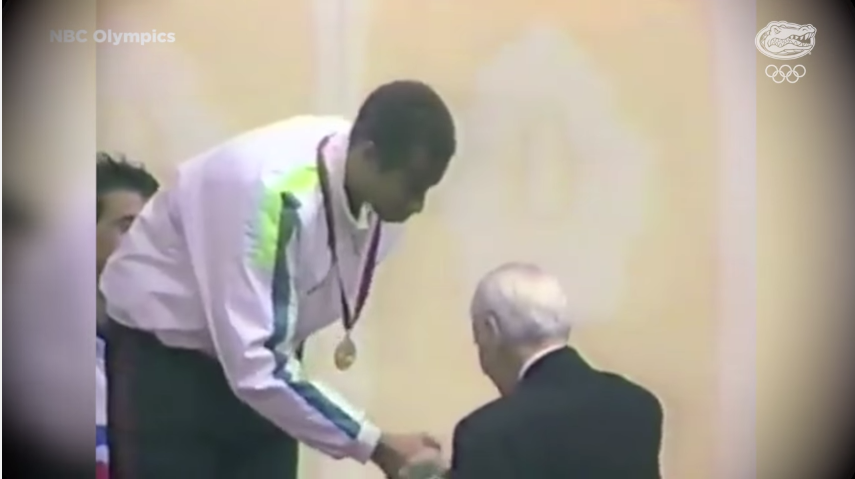If you were born in the late 1980s, or anytime after that, chances are you will not know who Anthony Nesty is.
Anthony Nesty is a retired competitive swimmer from a small country called Suriname, which has a population of under 600,000.
Here's where Suriname is:
 Screenshot from Google Maps
Screenshot from Google Maps
So, well, yes — it's small compared to the other South American countries, but it's still plenty bigger than Singapore — roughly 228 times bigger, to be exact.
Back to Nesty. We'd like to quickly run you through his story today:
The youngest of five children, Nesty was born in Trinidad in 1967, and his family migrated to Suriname when he was seven months old.
He started swimming at the age of five, in the one 50m pool in his entire country, and began competing in Suriname as well as in the Caribbean through his early teenage years.
His Olympic debut was at age 16, in 1984 in Los Angeles, where he placed 21st in the 100m butterfly event, and from there, he enrolled in the Bolles School (why yes, it sounds familiar to you because our man Schooling went there too!). He graduated from there three years later, but not before breaking fellow Olympic gold medallist Pablo Morales's 100m butterfly record, made at the school.
One year later, Nesty made Olympic history for Suriname — first, for being the first-ever Suriname athlete to qualify for an Olympic swimming final, and more importantly, for an incredible upset that made Nesty the first and only Olympic champion for Suriname — he is also the first and only medallist for Suriname.
Now during that time, the Olympics saw its fair share of epic American swimmers: in this case, it was freestyle and butterfly specialist Matt Biondi, who by 1988 had already won his first team relay gold in the 1984 Olympics, and was breaking records and winning individual gold medals at the World Championships.
By the time he took to the starting blocks at the 100m butterfly final race, Biondi already had five gold medals in his pocket.
Back once again to the 1988 Summer Olympics in Seoul — after Biondi enjoyed a fairly comfortable lead over the rest of the pack in the bulk of the 100m butterfly final race, Nesty shocked the world by touching the wall with one more stroke, 0.01 seconds sooner than the American.
That resulted in these historic scenes:
 Screenshot from video
Screenshot from video
 Screenshot from video
Screenshot from video
 Screenshot from video
Screenshot from video
It must have been incredible for anyone following swimming at the Olympics at the time, to witness this historic moment.
Thanks to the Internet and YouTube, all of us can revisit Nesty's incredible victory, with the commentator here putting his historic win in context:
" width="420" height="315" frameborder="0" allowfullscreen="allowfullscreen">
In this video, you can hear from him reflecting on his personally too:
" width="560" height="315" frameborder="0" allowfullscreen="allowfullscreen">
Now, while our man-of-the-week Schooling enjoyed a nearly half-body-length lead throughout most of his 100 fly final race, his victory is as significant and amazing for us as it must have been for anyone in Suriname at the time, and possibly even today — 28 years on.
And it was indeed — Nesty enjoyed a hero's welcome on his return. According to his entry on Olympic.org:
He was mobbed on the streets of Panamaribo; commemorative stamps and coins were issued bearing his image, as was a new version of the country’s 25 florin banknote. Surinam Airways even renamed one of their planes “Nesty” in his honour, and the government followed suit, choosing to rechristen the national stadium in the country’s capital.
Nesty went on to successfully defend his title in 1990 at the Goodwill Games and in 1991, at the FINA World Championships, although retired after clinching the bronze medal at the 1992 Olympic Games in Barcelona.
After his gold medal, though, he accepted a scholarship at the University of Florida, where he now coaches the Florida Gators, the university's swim team that he used to be a part of too.
Schooling's story can be said to be quite similar indeed, as some of you might already be able to tell: he came from a small country, attended and trained at the Bolles School, broke records while swimming there, got a scholarship to the University of Austin, Texas, trains with the Texas Longhorns, debuted at the London Olympics at age 17, and won his first gold medal (and Singapore's first, too) in Rio, his second Olympic Games.
In doing so, he also caused an Olympic-sized upset, and also in the 100m butterfly race.
Uncanny.
There was one significant difference between Nesty's and Schooling's stories that we'd like to point out, though, and that's how the Americans dealt with their respective losses.
According to this 1988 New York Times report on the race, Biondi showed a "grim" expression, and would only say to press, "I am very angry."
Phelps took his three-way silver-medal tie with Chad Le Clos and Lazlo Cseh like the epic champ he has grown to be, despite this upsetting his long-held streak in what is pretty much his pet event.
He's been reported as saying "hats off to him" for a "great race", and also that he was glad to have played a small part in inspiring Schooling to the heights he has already achieved, adding that he is excited to see how much faster our man can go.
Top photo of Anthony Nesty in 1992 from Getty Images.
If you like what you read, follow us on Facebook and Twitter to get the latest updates.
If you like what you read, follow us on Facebook, Instagram, Twitter and Telegram to get the latest updates.
